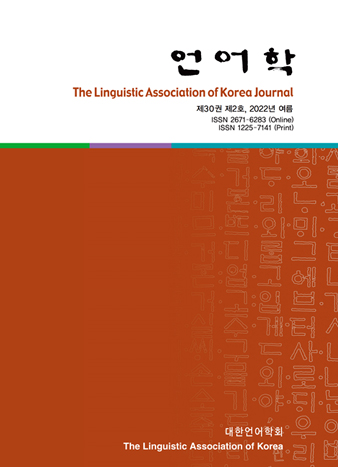대한언어학회 전자저널

30권 2호 (2022년 6월)
- Characteristics of Achievement Progressives in English
-
Ji-Hee Kim & Yae-Sheik Lee
Pages : 71-91
Abstract
Kim, Ji-Hee & Lee, Yae-Sheik. (2022). Characteristics of achievement progressives in English. The Linguistic Association of Korea Journal, 30(2), 71-91. It is well attested in the Aktionsart literature that rarely can achievement predicates appear in the progressive. In particular contexts, however, they do occur in this form. This study addresses this phenomenon. To do so, it mainly attempts the following three tasks: first, it accounts for the (in)compatibility of the progressive with achievement verbs in terms of the augmentation of instantaneous achievement event structures; second, it provides a formal definition of the progressive operator for achievement predicate-based progressives; and third, based on these first two accounts, it contends that achievement progressives inherently deliver anticipation of future events as futurate progressives do. Furthermore, this study compares the subevent structures of achievement and futurate progressives. Those of the former are temporally contiguous and necessary for the attainment of their telic points, while those of the latter do not require such temporal contiguity and necessity.
Keywords
# semantics of the achievement progressive # futurate progressive # mereological event structure # subevent # subinterval # Aktionsarten # culmination
References
- Dowty, D. (1979). Word meaning and Montague grammar. Dordrecht: Kluwer Academic Publishers.
- Dowty, D. (1986). The effects of aspectual class on the temporal structure of discourse: Semantics or pragmatics? Linguistics and Philosophy, 9(1), 37-61. Retrieved August 30, 2021, http://www.jstor.org/ stable/ 25001231.
- Goodman, F. (1973). On the semantics of futurate sentence. In Ohio State University Working Papers in Linguistics No. 16.
- Herweg, M. (1991). Perfective and imperfective aspect and the theory of events and states. Linguistics, 29, 969-1010.
- Kamp, H., & Uwe, R. (1993). From discourse to logic, vol 2. Dordrecht: Kluwer.
- Kang, M. (2021). Progressives with dense and discrete interval verbs in English. Paper presented in 2021 International Conference on Language & Cognition in conjunction with Symposia for Young Researchers in Linguistics.
- Kang, M., & Lee, Y.-S. (in preparation). Aspectual properties of the progressive in English.
- Kim, J. (1991). Events: Their metaphysics and semantics. Philosophy and Phenomenological Research, 51(3), 641-646. https://doi.org/10.2307/2107887.
- Krifka, M. (1989). Nominal reference and temporal constitution: Towards a semantics of quantity. In J. J. Groenendijk, M. Stokhof, & F. Veltman (Eds.), Proceedings of the 6th Amsterdam Colloquium, Institute of Linguistic, Logic and Information (pp. 153-173). University of Amsterdam, 1987.
- Krifka, M. (2021). Individuating matter over time. In H. Filip (Ed.), Countability in natural language (pp. 121-144). Cambridge: Cambridge University Press. doi:10.1017/97813168 23774.006.
- Landman, F. (1991). Structures for semantics. Dordrecht: Kluwer.
- Landman, F. (1992). The progressive. Natural Language Semantics, 1(1), 1-32.
- Leech, G. N. (1987). Meaning and the English verb (2nd ed.). London: Longman. Lewis, D. (1973). Causation. The Journal of Philosophy, 70(17), 556-567. https://doi.org/10.2307/2025310.
- Lewis, D. (1974). Counterfactuals. Tijdschrift Voor Filosofie, 36(3), 602-605.
- Mittwoch, A. (1991). In defense of Vendler’s achievements. Belgian Journal of Linguistics 6 (Perspectives on aspect and Aktionsart).
- Parsons, T. (1990). Events in the semantics of English: A study in subatomic semantics. Current Studies in Linguistics Series, 19. Cambridge, MA: MIT Press.
- Partee, B. H. (1984). Nominal and temporal anaphora. Linguistics and Philosophy, 7(3), 243-286.
- Piñón, C. (1997). Achievements in an event semantics. In Proceedings of Semantics and Linguistic Theory VII, 276-293. Ithaca, NY: Cornell University.
- Pustejovsky, J. (1996). The generative lexicon. Cambridge, Massachusetts: The MIT Press. Rothstein, S. (2004). Structuring events. Oxford: Blackwell Publishing.
- Smith, C. (1991). The Parameter of aspect. Dordrecht: Kluwer.
- Tobin, Y. (1993). Aspect in the English verb: Process and result in language. London: Longman.
- Vendler, Z. (1957). Verbs and times. The Philosophical Review, 66(2), 143-160. https://doi. org/10.2307/2182371.
- Verkuyle, H. J. (1989). Aspectual classes and aspectual composition. Linguistics and Philosophy, 12, 39-94.
- Zucchi, S. (1998). Aspect shift. In S. Rothstein (Ed.), Events and grammar. (pp. 349-370). Dordrecht: Kluwer. https://doi.org/10.1007/978-94-011-3969-4_15.